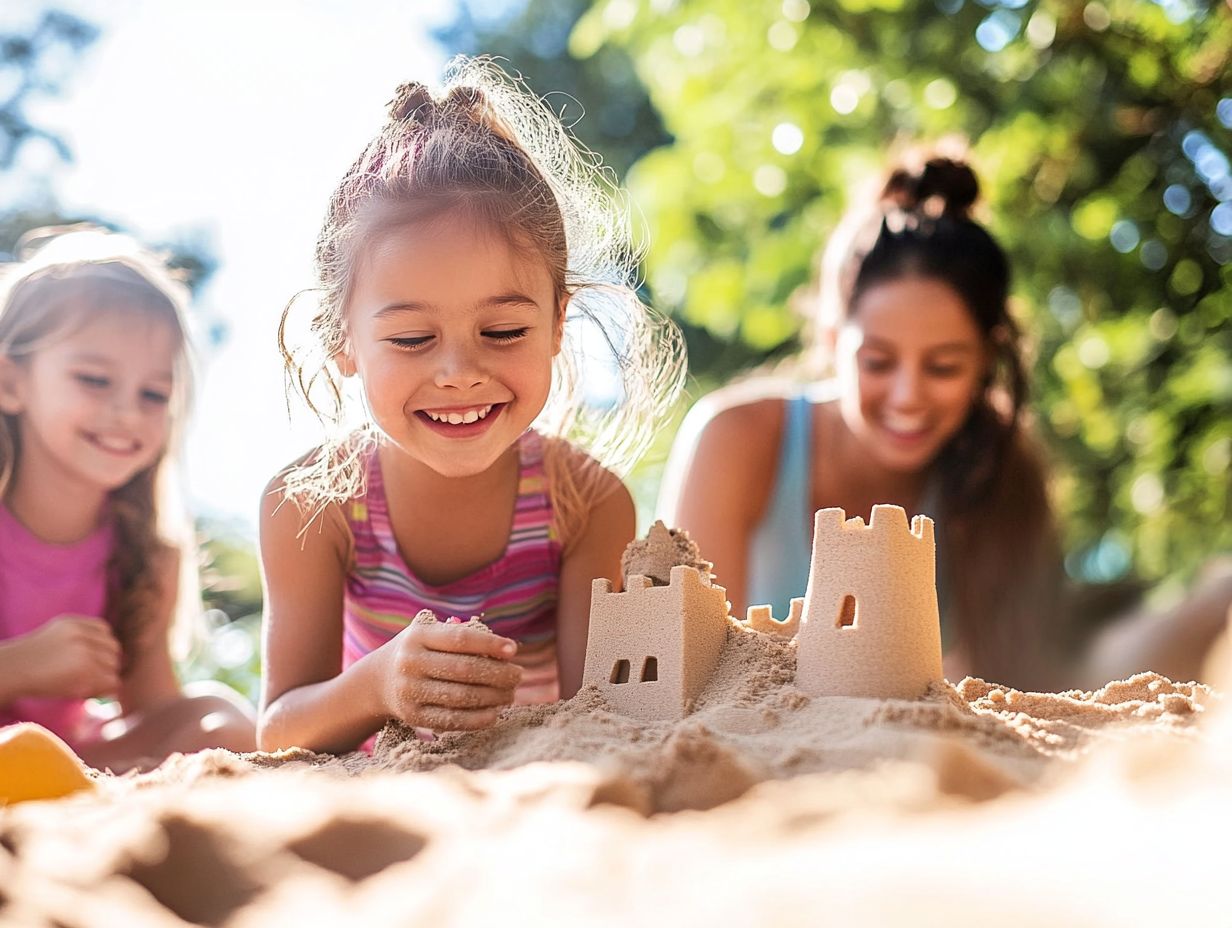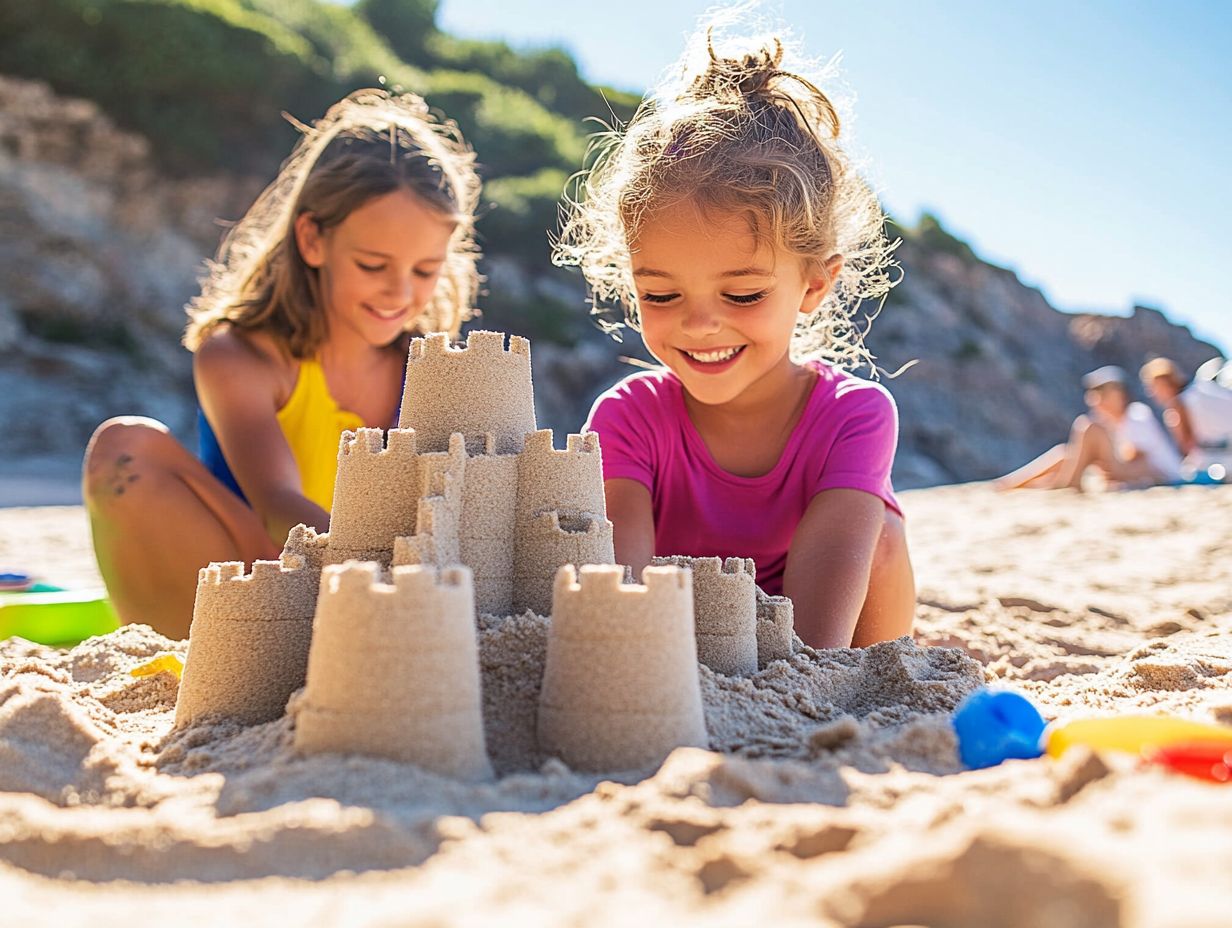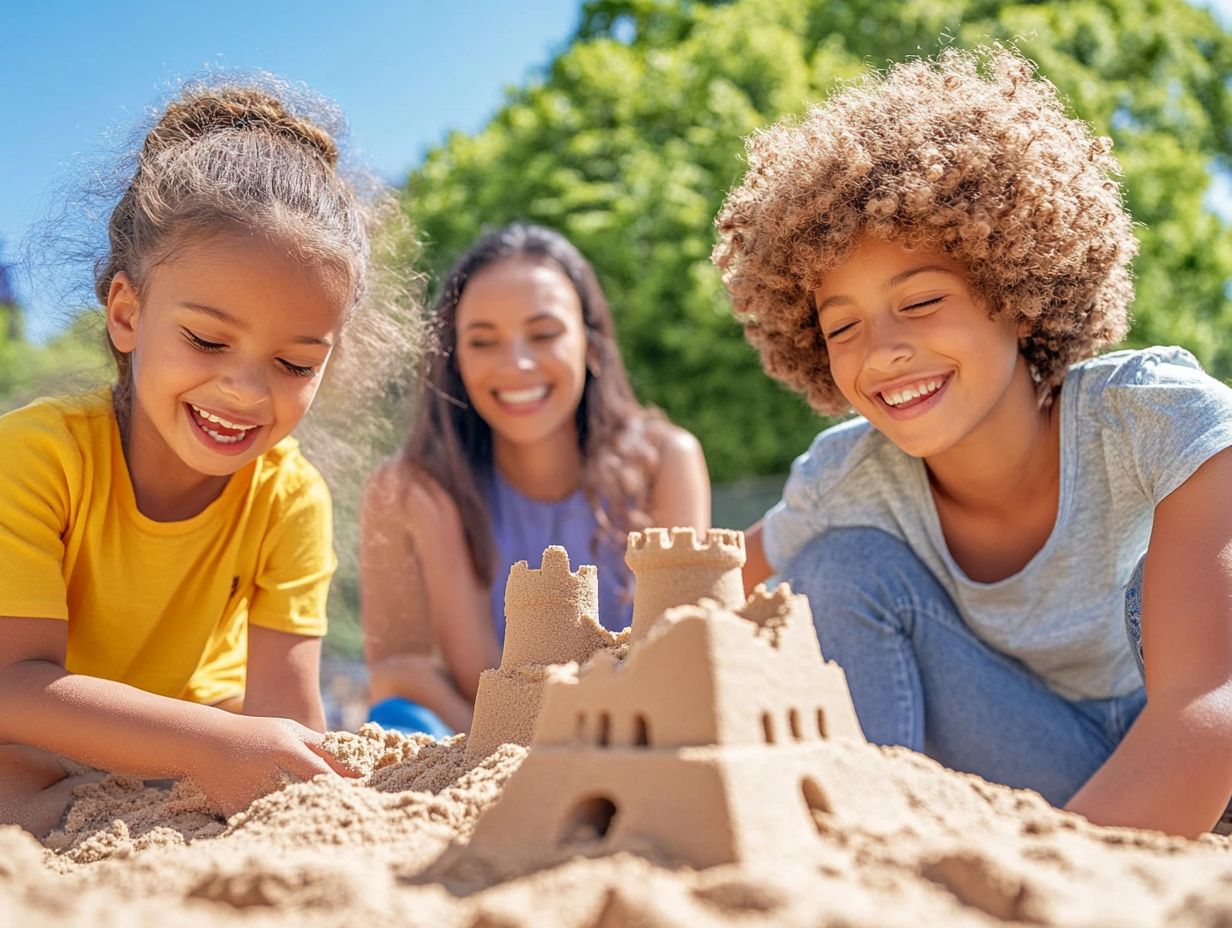The Role of Play in Communicating with Kids
Play transcends mere enjoyment; it is an essential element of childhood development that shapes your child’s physical, emotional, social, and cognitive abilities in important ways.
Grasping the importance of play can significantly elevate the way you engage with your children, enriching those connections in profound ways. Engaging in various playful activities can meet their developmental needs and support their mental health.
Let s explore the multifaceted nature of play not just as a key to growth, but also as a means to enhance communication and emotional well-being.
Uncover how various forms of play can foster trust, encourage self-expression, and serve as a powerful instrument for meaningful interaction with your kids.
Contents
- Key Takeaways:
- What Is Play?
- Why Is Play Important for Children?
- How Play Helps Kids Communicate: Supporting Emotional and Social Skills
- What Types of Play Are Beneficial for Communication with Kids?
- How Can Parents and Caregivers Use Play to Improve Communication with Kids?
- 1. Be Present and Engaged
- 2. Follow the Child’s Lead
- 3. Use Play to Address Difficult Topics and Behaviors
- 4. Encourage Communication and Self-Expression Through Play
- Frequently Asked Questions
- What is the role of play in communicating with kids and supporting their development?
- How does play help in building a strong relationship with kids and understanding their needs?
- What are some examples of play that can be used for communication and learning with kids?
- Can play be used to address challenging behaviors and support mental health in kids?
- Are there any benefits of incorporating play in communication and interaction with kids?
- How can parents and caregivers incorporate play in their communication and daily routines with kids?
Key Takeaways:

What Is Play?
Play serves as a fundamental process through which children engage in exploration and cultivate essential skills that form the foundation of their emotional, social, and cognitive development. It encompasses a wide array of experiences, from unstructured play to imaginative storytelling, allowing children the freedom to express their feelings and hone their self-regulation.
Esteemed educators like Friedrich Froebel and mental health experts emphasize the importance of play in early childhood development, showing how it helps enhance communication and problem-solving abilities. In a secure environment, play becomes a powerful vehicle for children to understand their feelings and get along with others, ultimately paving the way for healthy adult interactions and relationships.
Why Is Play Important for Children?
Play holds immense importance for children, as it serves multiple developmental purposes that significantly enrich their emotional, social, cognitive, and physical skills through engaging activities. Play also fosters creativity, independence, and curiosity.
It provides them the opportunity to explore their surroundings, ignite their imagination, and refine their communication and problem-solving abilities. Research emphasizes that play-based learning is directly linked to improved mental health and emotional regulation, nurturing both creativity and curiosity.
As children immerse themselves in play, they naturally acquire essential social skills, including empathy and conflict resolution, which are vital for their overall growth and development. These experiences support their understanding of societal issues and enhance their ability to navigate complex social dynamics.
In conclusion, engaging in play is crucial for your child’s development. By prioritizing play, parents can strengthen their bonds with their children and support their growth across all areas of life.
1. Physical Development (supports independence and confidence)
Physical development in children experiences remarkable enhancement through play. It includes various activities that promote movement, coordination, and strength. Encouraging play gives your child a chance to explore their physical potential, fostering independence and building confidence in their bodies.
Activities such as climbing, running, and playing with blocks are not just fun; they help develop both gross and fine motor skills. These skills set the foundation for a healthier lifestyle and improved coordination.
When children dive into imaginative play like building forts or pretending to be explorers in a backyard jungle they strengthen their muscles. They also enhance their spatial awareness and problem-solving abilities.
Outdoor activities like jumping rope or playing tag challenge them to push their limits and embrace risk-taking. This is vital for cultivating resilience.
Even simple tasks like filling and pouring sand at the playground refine their hand-eye coordination. This is an essential skill for later academic pursuits, like writing.
Through these playful experiences, your young ones learn to navigate their surroundings. This fosters a sense of autonomy and nurtures a lifelong love for physical activity.
Encouraging children to engage in a variety of physical activities helps build resilience and supports their overall well-being.
2. Emotional Development (supports understanding and expression of feelings)
Emotional development flourishes through play. This allows children to understand and express their feelings in a safe and nurturing environment.
Through various play activities, they learn to manage their emotions and develop coping mechanisms. They also gain the ability to articulate their feelings and experiences.
This enriching process not only enhances emotional well-being but also prepares children for future interactions with both peers and adults.
In these playful experiences, children encounter challenges that mirror real-life situations. This helps them navigate their emotions while fostering resilience.
As they engage in imaginative scenarios, they explore feelings of frustration, joy, and sadness. This deepens their understanding of themselves and others.
Such playful interactions cultivate empathy, enabling children to recognize emotions in their peers. This further enhances their social skills.
Play is key to unlocking emotional growth! It equips children with essential tools to manage their feelings and lays a solid foundation for healthy emotional development throughout their lives.
3. Social Development (supports empathy and conflict resolution)
Social development is intricately woven into the fabric of play. It offers children a unique opportunity to interact with peers, forge friendships, and acquire essential social skills.
During playtime, children immerse themselves in role-playing and collaborative activities. These not only encourage communication but also teach conflict resolution.
This playful engagement fosters empathy and broadens their understanding of different perspectives. It equips them with tools to navigate social dynamics and build meaningful relationships.
Through these enjoyable interactions, children practice negotiating rules, taking turns, and sharing. These are key elements of healthy relationships.
They become adept at reading social cues the non-verbal signals we pick up from others and responding to others’ emotions. This enhances their emotional intelligence, the ability to understand and manage emotions.
Friendships forged in play provide joy and comfort. They also serve as vital training grounds for resolving disagreements constructively.
This essential social play instills the values of collaboration and acceptance. It lays a strong foundation for future interactions.
As children mature, the skills cultivated during play become invaluable for effective communication and cooperation across diverse social landscapes. These interactions support the development of social competencies and help children navigate their social environments.
So get outside, join in the fun, and watch your child’s skills and confidence soar!
Cognitive Development: Supporting Creativity and Problem-Solving
Cognitive development in children is profoundly shaped by play, which ignites their curiosity and encourages them to explore their surroundings. As they dive into various play activities, they cultivate essential skills like problem-solving, creativity, and a deeper understanding of cause and effect. In play-based learning environments, they seamlessly blend fun with education, allowing knowledge to be acquired in a natural and joyous manner.
Through imaginative and unstructured play scenarios, children learn to navigate challenges and exercise critical thinking. This sharpens their ability to assess situations and devise innovative solutions.
This process not only nurtures their creativity but also fosters a habit of inquiry, prompting them to ask questions and seek answers as they engage with the world around them.
Collaborative play presents valuable opportunities for social learning, where teamwork and communication skills flourish alongside cognitive development. Thus, play transcends mere pastime; it serves as a crucial element in shaping the inquisitive minds of the next generation. Understanding and supporting play in early childhood can have profound impacts on a child’s development and success in various areas.
How Play Helps Kids Communicate: Supporting Emotional and Social Skills

Play is a powerful way for children to communicate, offering them a unique platform to express themselves and engage with others.
Through diverse play scenarios, children learn to share their thoughts and feelings, hone their non-verbal communication skills, and practice effective interactions with both peers and adults. These interactions support their overall communication development and enhance their ability to express themselves.
Educators understand the profound value of play in enhancing communication abilities, recognizing that it creates a comfortable space where children feel enabled to share their ideas and perspectives without hesitation.
Building Trust and Bonding Through Play
Engaging in play with children is an excellent way to build trust and strengthen the bond between them and adults, laying a solid foundation for healthy relationships. This interaction enables children to feel secure and understood, fostering open lines of communication where they feel comfortable sharing their thoughts and feelings. The trust developed through play enhances a child s sense of safety and encourages further exploration and emotional expression. These experiences help children develop self-esteem and a strong sense of identity.
Consider collaborative activities like building a fort together. These moments encourage teamwork and communication, allowing children to express their ideas and negotiate roles naturally. Role-playing games offer a safe space for kids to act out various scenarios, enriching their understanding of social dynamics and emotional responses.
Participating in sports or outdoor activities not only promotes physical development but also fosters camaraderie, teaching children about cooperation and mutual respect. These playful interactions create lasting memories, reinforcing bonds while establishing the groundwork for effective communication skills that will benefit their relationships throughout life!
Don’t miss out on the incredible benefits that play can bring to your child’s growth!
2. Encourages Expression and Creativity
Play is a powerful vehicle for encouraging children to express themselves creatively. It allows them to utilize their imagination to explore various scenarios and narratives. Through imaginative play and storytelling, children gain confidence in articulating their ideas and emotions, which is essential for effective communication.
When they engage in activities like role-playing, children delve into different perspectives and hone their creative problem-solving skills.
As they craft stories and step into different roles, they learn to navigate complex social situations and develop a deeper understanding of the feelings of others, enhancing their empathy. Engaging in play fosters originality and encourages collaboration when they work with peers to build narratives together.
This shared creativity cultivates an environment where ideas flow freely, allowing young minds to flourish.
Such experiences lay the groundwork for both verbal and non-verbal communication skills, which are vital for success in school and beyond. Ultimately, through playful exploration, children embrace their creativity and develop the foundational skills necessary for meaningful interactions throughout their lives.
3. Teaches Communication Skills
Play serves as an essential mechanism for equipping children with important ways to communicate. It enables them to interact with peers and adults in meaningful ways. Through various play experiences, children learn to articulate their thoughts, engage in conflict resolution, and develop empathy towards others. These skills are crucial for effective social interactions and significantly contribute to their overall emotional and social development.
When children immerse themselves in imaginative play scenarios, they negotiate roles, share ideas, and express their feelings. These activities enhance their language abilities and deepen their understanding of social cues. As they navigate disagreements and differing opinions during playtime, they practice essential conflict resolution strategies, learning to compromise and collaborate.
This process strengthens their ability to communicate effectively and nurtures their capacity for empathy, as they begin to recognize and appreciate the perspectives and emotions of their playmates. Play functions as a powerful tool that lays the foundation for robust communication skills, vital in their interactions both inside and outside the classroom.
What Types of Play Are Beneficial for Communication with Kids?
Did you know that engaging in different types of play can supercharge your child’s communication skills? Each form of play offers unique benefits that enrich their social interactions and emotional expression.
Imaginative play invites children to explore different narratives and characters. It allows for creative freedom and self-expression. Role-playing fosters empathy and helps them understand diverse perspectives.
Board games and puzzles encourage turn-taking and strategic communication. Outdoor play promotes active engagement and social interactions with peers. Each of these activities is not just a pastime; they are essential building blocks for your child’s holistic development.
1. Imaginative Play
Imaginative play serves as an exceptional catalyst for enhancing creativity and communication in children. It enables them to delve into their thoughts and feelings through the art of storytelling and role-playing. This form of play invites children to invent scenarios, develop unique characters, and articulate their narratives, greatly increasing their confidence in expressing themselves to others.
Consider activities like puppet shows, where children craft their own characters and dialogue, or dressing up as superheroes to embark on fantastical adventures. These activities let them explore many feelings and viewpoints. Storytelling circles, where they share their imaginative tales, enhance their narrative skills and cultivate their ability to listen and respond thoughtfully to their peers.
Such experiences nurture their imagination and social skills. As they engage in collaborative storytelling and character development, they forge relationships through the shared joy of creativity.
2. Role-Playing
Engaging in role-playing can be an incredibly effective way for you to enhance communication and empathy in children. It provides them with the opportunity to step into various characters and situations, allowing for a deeper understanding and perspective-taking.
As they immerse themselves in these roles, they gain the ability to articulate their thoughts and feelings while effectively navigating social dynamics. Consider when children participate in role-play scenarios, such as pretending to be a doctor caring for a stuffed animal or a teacher managing a classroom.
In these moments, they explore complex interactions and demonstrate qualities like care, responsibility, and leadership. This kind of imaginative play not only sharpens their verbal skills but also cultivates active listening as they respond to their peers’ cues and emotional expressions.
Through these joyful experiences, children begin to comprehend the significance of diverse viewpoints, nurturing a greater social understanding and emotional intelligence both crucial for fostering meaningful relationships and harmonizing with others.
3. Board Games and Puzzles

Board games and puzzles serve as exceptional tools for fostering communication and interaction among children, as they inherently require cooperation, strategizing, and turn-taking. These activities not only encourage the expression of ideas and thoughts but also enhance the ability to listen and collaborate effectively with others.
Consider games like Catan and Ticket to Ride ; they demand teamwork and strategic thinking. Players must negotiate trades and plan routes while keeping a keen eye on their opponents moves. Such interactions naturally cultivate important skills like empathy and patience, as children learn to appreciate various perspectives in a playful setting.
Engaging in collaborative puzzles, like tackling a 1000-piece jigsaw challenge, instills a profound sense of shared achievement, highlighting the true value of teamwork. Through these enriching experiences, children not only sharpen their critical thinking skills, which means evaluating information and making decisions based on it, but also improve their capacity to communicate effectively with peers, ultimately building lasting social connections.
4. Outdoor Play
Outdoor play is essential for your child’s communication development, providing invaluable opportunities for active engagement and social interaction in ever-changing environments. Through outdoor activities, your child learns to express themselves, negotiate roles, and collaborate with peers, all while enhancing their communication skills during exploration.
This kind of interaction is crucial, as it nurtures their ability to grasp non-verbal cues and respond aptly, understanding different social situations. During playtime, they not only forge friendships but also cultivate empathy and an understanding of group dynamics, which are vital for effective communication.
The diverse settings encountered during outdoor play whether it s a park, playground, or open field stimulate imaginative thinking and problem-solving as your child collaborates with others to tackle challenges. These experiences play a significant role in building their overall social competence, equipping them with the essential tools to engage positively with those around them throughout their lives.
How Can Parents and Caregivers Use Play to Improve Communication with Kids?
Parents and caregivers have the opportunity to harness the power of play as a compelling means to enhance communication with children, creating a nurturing environment that caters to their developmental needs.
By participating in play activities together, you can model effective communication, build trust, and encourage children to articulate their feelings and ideas freely. This interaction not only deepens the bond between you and your child but also enriches your understanding of their unique perspectives and emotions.
Start incorporating these playful activities into your routine today to boost your child’s communication skills!
1. Be Present and Engaged
Being present and engaged during playtime is essential for you as a parent or caregiver to help your child communicate better. When you actively participate in play activities, you create a supportive environment that encourages them to share their thoughts and feelings.
This not only strengthens your relationship but also enhances their sense of security. Your involvement showcases genuine interest and reinforces the bond between you and your child, transforming interactions into rich and meaningful experiences.
Simple techniques like maintaining eye contact, using encouraging language, and mirroring your child s emotions can significantly boost your engagement. Setting aside distractions such as phones or televisions allows for more focused interactions, which are crucial for healthy communication.
By prioritizing your presence during play, you enable children to articulate their ideas and emotions more freely, ultimately leading to improved social skills, emotional well-being, and emotional intelligence over time.
2. Follow the Child’s Lead
Following your child’s lead during play is crucial for fostering effective communication while supporting their exploration and creativity. When you allow them to guide the play experience, you cultivate a sense of autonomy that encourages them to express their ideas and feelings more openly, which in turn enhances their communication skills.
By tuning into your child’s interests, you can create an engaging environment that embraces spontaneity and curiosity. For example, if they pick up a toy dinosaur, you might build on that moment by asking open-ended questions about the adventures the dinosaur could embark on, promoting imaginative storytelling in the process.
Similarly, if your child begins to create their own game, stepping back to observe can provide valuable insight into their thought process while allowing you to offer support only when necessary. This approach nurtures their sense of ownership in the play and lays a solid foundation for developing cognitive skills, like problem-solving and memory.
3. Use Play to Address Difficult Topics and Behaviors
Using play to tackle tough topics is a powerful strategy that really works! By introducing playful scenarios, you can gently present sensitive issues, allowing children to express their feelings and thoughts without the fear of judgment. This approach offers essential support when it matters most!
Engaging in role-playing games, for example, enables you to simulate real-life situations that may evoke anxiety or confusion in children, such as moving to a new home or coping with a loss. This interactive method creates a safe space for children to explore their emotions, making it easier for them to articulate their worries or misunderstandings.
Incorporating storytelling into your interactions can also be beneficial; by reading books that reflect similar challenges, you can prompt meaningful discussions about emotions and coping strategies. Ultimately, these techniques underscore the importance of nurturing an environment where children feel heard and validated, fostering their emotional resilience and self-regulation.
4. Encourage Communication and Self-Expression Through Play
Encouraging communication through play is essential for nurturing your child’s ability to express their thoughts and feelings. By creating opportunities for dialogue during playtime, you can ask open-ended questions and promote interactive activities that stimulate conversation and self-expression.
For instance, during a puppet show, you might engage your child by asking questions like, “What do you think the puppet is feeling right now?” or “How would you respond if you were in that situation?” These prompts invite your child to articulate their thoughts while simultaneously fostering empathy.
Activities like building with blocks can also facilitate collaborative storytelling. You could say, “What happens next in our story?” Such playful interactions encourage verbal expression and enhance social skills, allowing your child to navigate their emotions and ideas within a supportive environment. These activities also help develop problem-solving skills.
Frequently Asked Questions

Curious about how play enhances communication with kids? Here are some common questions answered!
What is the role of play in communicating with kids and supporting their development?
Play is a crucial tool for communicating with kids as it allows them to express their thoughts, feelings, and experiences in a non-verbal way. It supports their overall development.
How does play help in building a strong relationship with kids and understanding their needs?
Through play, adults can gain insight into a child’s world and understand their perspective. This helps address their needs and build trust and rapport with them.
What are some examples of play that can be used for communication and learning with kids?
Examples of play can include imaginative play, role-playing, art activities, unstructured play, and outdoor games, among others.
Can play be used to address challenging behaviors and support mental health in kids?
Yes, play can help address challenging behaviors and support kids’ mental health. It allows them to express and work through their feelings in a safe environment.
Are there any benefits of incorporating play in communication and interaction with kids?
Yes, play helps build communication skills in kids. It also enhances their cognitive, emotional, and social development. Play fosters creativity, empathy, and problem-solving abilities.
How can parents and caregivers incorporate play in their communication and daily routines with kids?
Parents and caregivers can incorporate play in various ways, such as setting aside dedicated playtime, joining in on the child’s play, and using toys and games to facilitate communication. Encouraging unstructured play and integrating it into daily routines can also be beneficial.






